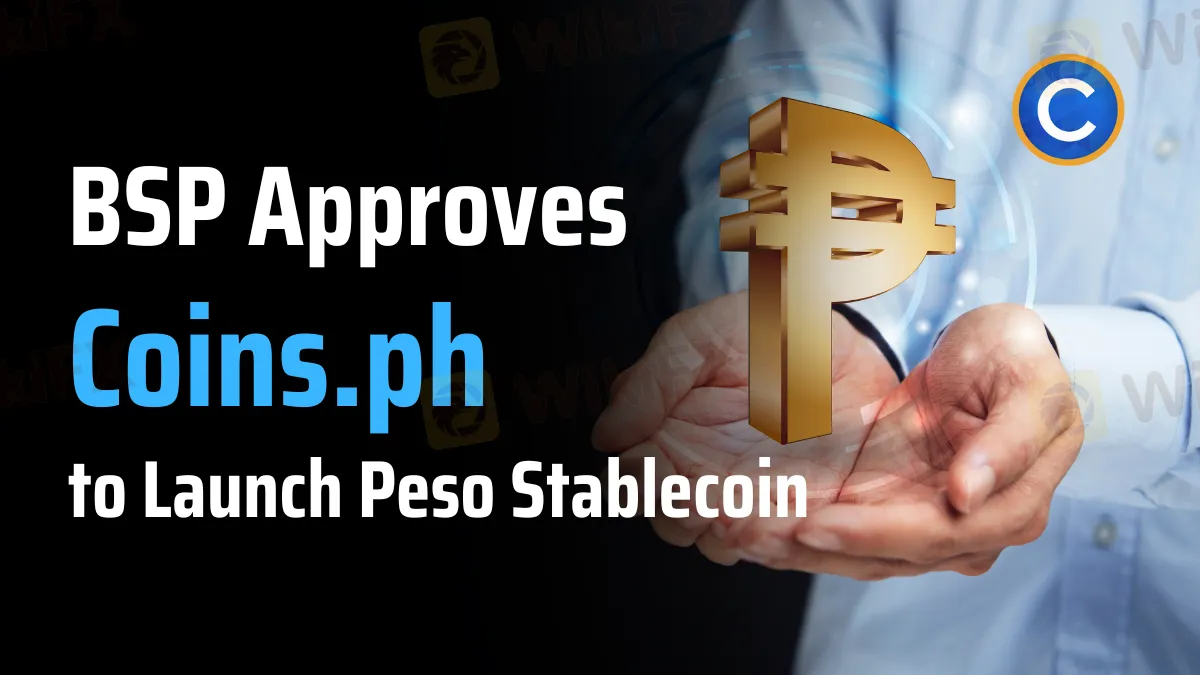简体中文
繁體中文
English
Pусский
日本語
ภาษาไทย
Tiếng Việt
Bahasa Indonesia
Español
हिन्दी
Filippiiniläinen
Français
Deutsch
Português
Türkçe
한국어
العربية
BSP Approves Coins.ph to Launch Peso Stablecoin
Abstract:In the Philippines, Coins.ph receives BSP approval for PHPC, a peso-backed stablecoin, launching in June for peer-to-peer transactions.

Coins.ph has received approval from the Bangko Sentral ng Pilipinas (BSP) to launch PHPC, a stablecoin backed by the Philippine peso, marking a key milestone for the country's financial technology industry. The launch of this cutting-edge digital currency on the Coins.ph platform in early June will be a watershed moment in the country's digital transformation of financial transactions.
Wei Zhou, the CEO of Coins.ph, made the news during a Taguig City press conference. Zhou emphasized that after starting the procedure in the first quarter of the year, the business got BSP clearance for a sandbox in April. It will take two to three months to complete the sandbox, a regulatory framework for evaluating innovative financial innovations. Coins.ph wants to achieve certain KPIs and incorporate 20,000–30,000 users into the system in this time frame.

PHPC can change the Philippines' financial sector. It is 1:1 pegged to the Philippine peso and backed by cash and currency equivalents kept in local bank accounts, ensuring stability. This agreement will provide users with access to a stable and trustworthy digital currency, ensuring that each PHPC is equivalent to one real peso.
Its launch is significant because PHPC is the first peso-backed stablecoin that is usable for retail purposes. It supports both peer-to-peer transactions and business-to-business contacts. This broad variety of possible applications indicates a substantial shift in the way digital transactions are conducted, from traditional banking hours to a more dynamic, round-the-clock financial interaction paradigm.
Remittances are an important source of income for many Filipinos, thus, Zhou predicts that this will be one of PHPC's main uses. “PHPC is expected to lower the costs and barriers for sending money back home,” Zhou said. “Moreover, it enables real-time transactions at any time of the day, significantly enhancing the efficiency of financial transfers.”
The BSP-supervised launch of PHPC by Coins.ph is a significant development as the Philippines' financial industry embraces digital innovation. It is compatible with the global trend toward more linked and real-time financial systems, as well as the growing trend toward digitalization. PHPC is expected to play a significant role in the Philippines' digital financial environment because of its capacity to revolutionize a variety of financial operations, including trading, payments, and remittances.

Disclaimer:
The views in this article only represent the author's personal views, and do not constitute investment advice on this platform. This platform does not guarantee the accuracy, completeness and timeliness of the information in the article, and will not be liable for any loss caused by the use of or reliance on the information in the article.
Read more

OctaFX Back in News: ED Attaches Assets Worth INR 134 Cr in Forex Scam Case
The Enforcement Directorate (ED) in Mumbai has attached assets worth around INR 131.45 crore. This included a luxury yacht and residential properties in Spain. Read this interesting story.

Oil Prices Stay Firm on Solid US Jobs Data
Oil prices stayed firm this week as the US labour department posted a better-than-expected payroll data in June 2025. Read this news in detail.

US Jobs Data Out: Boom in Government Sector, Not So in Private Sector
Jobs grew unexpectedly in June 2025 as per the data released from the US Labor Department. However, the government sector contributed more than half to the non-farm payroll. Read this to find out why private sector struggles to add jobs in the US.

FIBO Group MT5 Cent Account with Ultra-Leverage up to 1:5000 for Beginners
FIBO Group's MT5 Cent account offers a low-deposit Forex trading account with ultra-high leverage up to 1:500 for testing strategies on MetaTrader 5.
WikiFX Broker
Latest News
CFD Brokers Face Dual Compliance Pressures Ahead of 2026: Australia and EU Tighten Rules
Services Surveys Signal 'Expansion' In June, Inflation Fears Remain High
Major Risks Associated with AuxiliumFX: You Need to Know
ASIC cancels AFS licences of Ipraxis and Downunder Insurance Services
CFI Financial Group Becomes Official Online Trading Partner of Etihad Arena
FxPro to Launch Crypto Trading Desk, Deepening Digital Asset Push
Global Brokers Vs. Indian Rules: Why They Struggle in India
Discover 5 Benefits of Trading with Trive FX Broker
Indian regulator bars U.S. firm Jane Street from accessing securities market, impounds $566 million in manipulation probe
Asia-Pacific markets trade mixed ahead of Trump's deadline for higher tariffs
Currency Calculator


